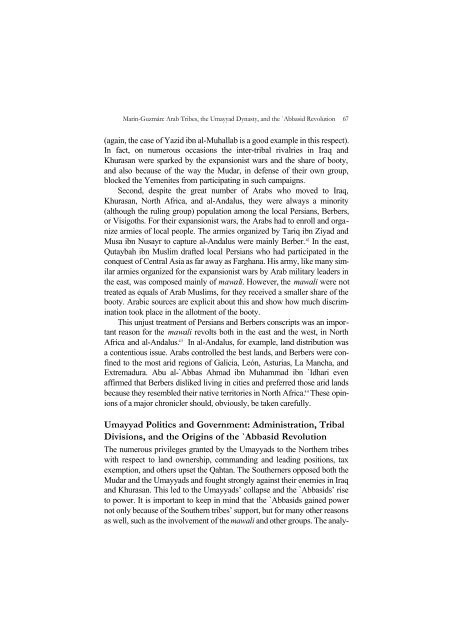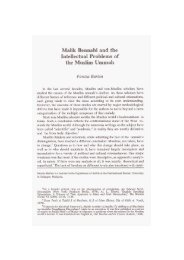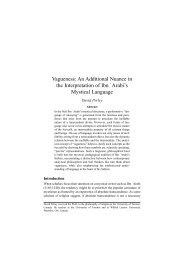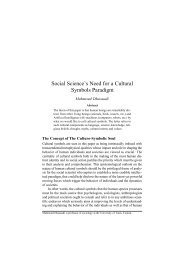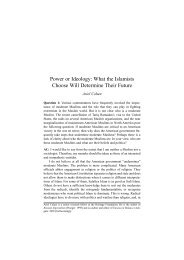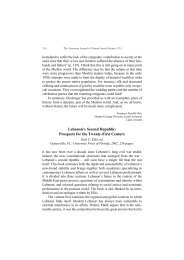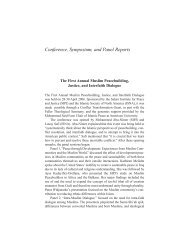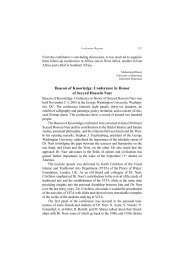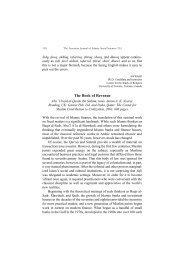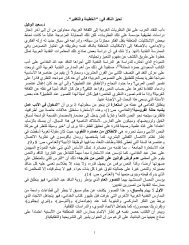Arab Tribes, the Umayyad Dynasty, and the `Abbasid ... - Epistemology
Arab Tribes, the Umayyad Dynasty, and the `Abbasid ... - Epistemology
Arab Tribes, the Umayyad Dynasty, and the `Abbasid ... - Epistemology
Create successful ePaper yourself
Turn your PDF publications into a flip-book with our unique Google optimized e-Paper software.
Marín-Guzmán: <strong>Arab</strong> <strong>Tribes</strong>, <strong>the</strong> <strong>Umayyad</strong> <strong>Dynasty</strong>, <strong>and</strong> <strong>the</strong> <strong>`Abbasid</strong> Revolution 67<br />
(again, <strong>the</strong> case of Yazid ibn al-Muhallab is a good example in this respect).<br />
In fact, on numerous occasions <strong>the</strong> inter-tribal rivalries in Iraq <strong>and</strong><br />
Khurasan were sparked by <strong>the</strong> expansionist wars <strong>and</strong> <strong>the</strong> share of booty,<br />
<strong>and</strong> also because of <strong>the</strong> way <strong>the</strong> Mudar, in defense of <strong>the</strong>ir own group,<br />
blocked <strong>the</strong> Yemenites from participating in such campaigns.<br />
Second, despite <strong>the</strong> great number of <strong>Arab</strong>s who moved to Iraq,<br />
Khurasan, North Africa, <strong>and</strong> al-Andalus, <strong>the</strong>y were always a minority<br />
(although <strong>the</strong> ruling group) population among <strong>the</strong> local Persians, Berbers,<br />
or Visigoths. For <strong>the</strong>ir expansionist wars, <strong>the</strong> <strong>Arab</strong>s had to enroll <strong>and</strong> organize<br />
armies of local people. The armies organized by Tariq ibn Ziyad <strong>and</strong><br />
Musa ibn Nusayr to capture al-Andalus were mainly Berber. 42 In <strong>the</strong> east,<br />
Qutaybah ibn Muslim drafted local Persians who had participated in <strong>the</strong><br />
conquest of Central Asia as far away as Farghana. His army, like many similar<br />
armies organized for <strong>the</strong> expansionist wars by <strong>Arab</strong> military leaders in<br />
<strong>the</strong> east, was composed mainly of mawali. However, <strong>the</strong> mawali were not<br />
treated as equals of <strong>Arab</strong> Muslims, for <strong>the</strong>y received a smaller share of <strong>the</strong><br />
booty. <strong>Arab</strong>ic sources are explicit about this <strong>and</strong> show how much discrimination<br />
took place in <strong>the</strong> allotment of <strong>the</strong> booty.<br />
This unjust treatment of Persians <strong>and</strong> Berbers conscripts was an important<br />
reason for <strong>the</strong> mawali revolts both in <strong>the</strong> east <strong>and</strong> <strong>the</strong> west, in North<br />
Africa <strong>and</strong> al-Andalus. 43 In al-Andalus, for example, l<strong>and</strong> distribution was<br />
a contentious issue. <strong>Arab</strong>s controlled <strong>the</strong> best l<strong>and</strong>s, <strong>and</strong> Berbers were confined<br />
to <strong>the</strong> most arid regions of Galicia, León, Asturias, La Mancha, <strong>and</strong><br />
Extremadura. Abu al-`Abbas Ahmad ibn Muhammad ibn `Idhari even<br />
affirmed that Berbers disliked living in cities <strong>and</strong> preferred those arid l<strong>and</strong>s<br />
because <strong>the</strong>y resembled <strong>the</strong>ir native territories in North Africa. 44 These opinions<br />
of a major chronicler should, obviously, be taken carefully.<br />
<strong>Umayyad</strong> Politics <strong>and</strong> Government: Administration, Tribal<br />
Divisions, <strong>and</strong> <strong>the</strong> Origins of <strong>the</strong> <strong>`Abbasid</strong> Revolution<br />
The numerous privileges granted by <strong>the</strong> <strong>Umayyad</strong>s to <strong>the</strong> Nor<strong>the</strong>rn tribes<br />
with respect to l<strong>and</strong> ownership, comm<strong>and</strong>ing <strong>and</strong> leading positions, tax<br />
exemption, <strong>and</strong> o<strong>the</strong>rs upset <strong>the</strong> Qahtan. The Sou<strong>the</strong>rners opposed both <strong>the</strong><br />
Mudar <strong>and</strong> <strong>the</strong> <strong>Umayyad</strong>s <strong>and</strong> fought strongly against <strong>the</strong>ir enemies in Iraq<br />
<strong>and</strong> Khurasan. This led to <strong>the</strong> <strong>Umayyad</strong>s’ collapse <strong>and</strong> <strong>the</strong> <strong>`Abbasid</strong>s’ rise<br />
to power. It is important to keep in mind that <strong>the</strong> <strong>`Abbasid</strong>s gained power<br />
not only because of <strong>the</strong> Sou<strong>the</strong>rn tribes’ support, but for many o<strong>the</strong>r reasons<br />
as well, such as <strong>the</strong> involvement of <strong>the</strong> mawali <strong>and</strong> o<strong>the</strong>r groups. The analy-


